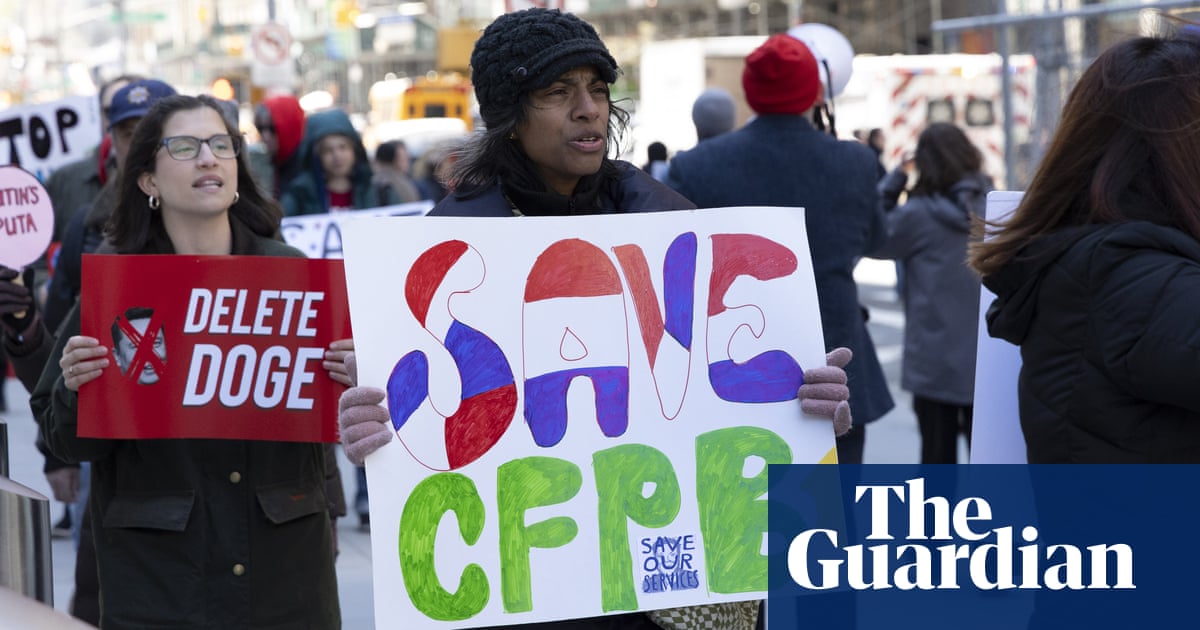A federal court has blocked the sweeping termination of staff at the top US consumer protection agency, a day after the Trump administrationmoved to axe about 1,500 of the agency’s 1,700 workforce, while officials investigate whether the action violated existing judicial orders.
The ruling from the judge Amy Berman Jackson put a legal hurdle in front of mass layoffs at the Consumer Financial Protection Bureau (CFPB) announced on Thursday, which came after a federal appeals court modified – but did not eliminate – an injunction limiting the agency’s ability to terminate employees.
The administration did not immediately respond to a request for comment. It is unclear whether it will abide by the latest ruling.
A handful of divisions have been completely eliminated by the administration, according to court filings, including the office of servicemember affairs, the office of older Americans, and the office of fair lending. Only eight employees remain in the office of consumer response, while the entire team responsible for the CFPB’s data storage systems has been terminated.
The layoffs, via hundreds of reduction in force (RIF) letters sent on Thursday, are just the latest blow in an ongoing battle over the agency’s bleak future.
In February, Jackson had ordered a halt to terminations at the CFPB and barred the agency from deleting data or transferring reserve funds except for operational purposes.
According to a declaration from an employee who had been laid off, filed under the pseudonym Alex Doe, this week’s layoffs were managed by Gavin Kliger,a staffer at the tech billionaire Elon Musk’s so-called “department of government efficiency”, or Doge. “He kept the team up for 36 hours straight to ensure that the notices would go out yesterday (17 April).”
That declaration also said that when team members raised concerns about court orders requiring “particularized assessment” of employees, “they were told that all that mattered was the numbers”.
The staff union immediately filed a motion for an order to show cause, arguing the terminations violate the court’s preliminary injunction which prohibited actions that “would interfere with the performance of the defendants’ statutory duties”.
“We started receiving our RIF notices yesterday afternoon and they went out in batches through the evening,” said one CFPB employee who requested anonymity fearing retaliation. “As a result, large swaths of the work we do, including statutorily required work, won’t get done.”
Following the cuts, all affected employees will lose system access by 6.00pm local time on Friday, after which they will be placed on administrative leave until formal separation, according to a copy of the RIF reviewed by the Guardian.
The senator Elizabeth Warren, who originally proposed creating the CFPB after the 2008 financial crisis, blasted the move.
“President Trump just gutted almost all CFPB staff, so the agency can’t do its job of helping Americans who get scammed by big banks and giant corporations,” Warren said in a statement. “Dismantling the CFPB in the face of a court order blocking an illegal shutdown is yet another assault on consumers and our democracy.”
Many have pointed to the influence of Musk, who reportedly placed Doge employees inside the agency and has publicly made a call to “delete” the CFPB for being duplicative of other regulators. Musk has been accused of being the mastermind behind the shutdown so it could benefit his planned financial services platform, X Money, as part of his social media platform’s eventual aspiration to become an everything app.
Since its creation, the bureau has recovered over $21bn for defrauded consumers through enforcement actions against major financial institutions, including a $3.7bn order against Wells Fargo in 2022. There has been broad support for the agency, with aSeptember pollfrom Americans for Financial Reform finding that 91% of voters believed it is important to regulate financial services to make sure they are fair for consumers – including 95% of Democrats and 87% of Republicans.
“[It] breaks my heart that they’re just erasing so much work and goodwill,” said another laid-off CFPB employee. “And people all over the country have no idea that the things they count on are disappearing.”
